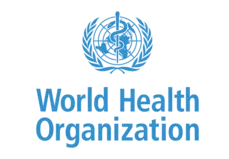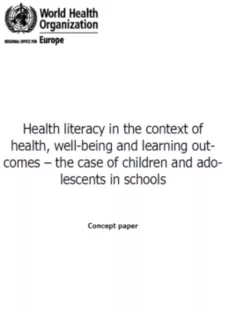Health literacy in schools at the World Health Organization

Health literacy has to be understood as a holistic life course approach, and is closely linked to lifelong learning. As early as 2013, the World Health Organization (WHO) highlighted the importance of schools for strengthening health literacy in its publication "Health literacy: the facts" and proposed health literacy as an essential part of the "Health Promoting School". Most recently, WHO went even further and defined health literacy in schools and education as one of the three key strategies for health promotion and for achieving the Sustainable Development Goals by the year 2030 in the declaration of the 9th Global Conference on Health Promotion in Shanghai, China in 2016 (the Shanghai Declaration). WHO's Policy Brief 19 "Investing in health literacy: what do we know about the co-benefits to the education sector of actions targeted at children and young people?" is another key document based on an evidence synthesis, presenting and critically discussing the social and economic benefits for European education systems and societies when promoting health literacy already as early as in schools.
In collaboration with international colleagues from WHO Europe and various academic institutions, Orkan Okan developed the report "Health literacy in the context of health, well-being and learning outcomes - the case of children and adolescents in schools" for WHO. This report defines (digital) health literacy for schoolchildren, summarizes key findings, and presents a framework action plan for developing and implementing strategies to strengthen health literacy in European schools and beyond. In addition, the central role of schools in health literacy is elaborated, differences between European school systems are discussed, the role of teachers and school leaders is highlighted, and two curriculum approaches to strengthen health literacy in the classrooms of Germany and Finland are presented. Furthermore, following the HeLit-Schools project and the WHO report "Health literacy: the facts", the authors propose to integrate health literacy into the Health Promoting School approach.
Summary
Heath literacy, the ability of individuals to understand, critically appraise and use information related to their health, is an important component of education and has become more prominent during the COVID-19 pandemic. Approaches to improving health literacy education in schools are lacking in many European countries. This report makes the case for including health literacy education in schools, classrooms and professional education and training to the benefit of the education and health sectors, and suggests ways this can be achieved. The report: provides a brief overview of evidence on health literacy in children and adolescents; highlights the critical role of the education sector as beneficiary and implementer; places health literacy in schools within the wider WHO health literacy strategy and the whole-school approach; identifies key health literacy learning objectives and indica-tors; and suggests action opportunities for implementation and evaluation of health literacy in schools.
Source: WHO report on health literacy in schoos and education

